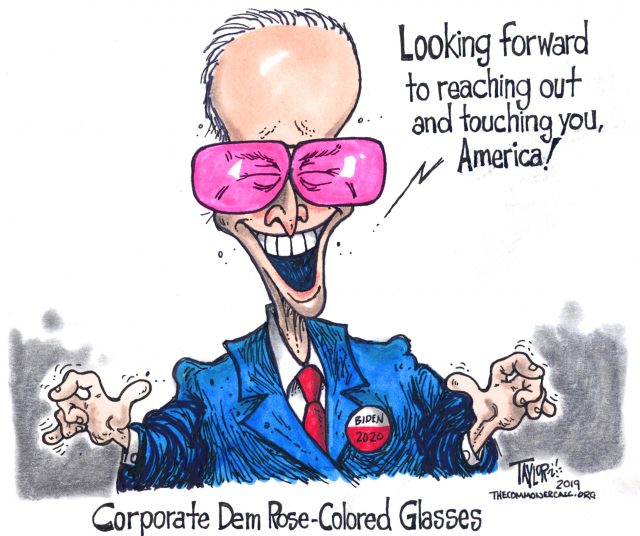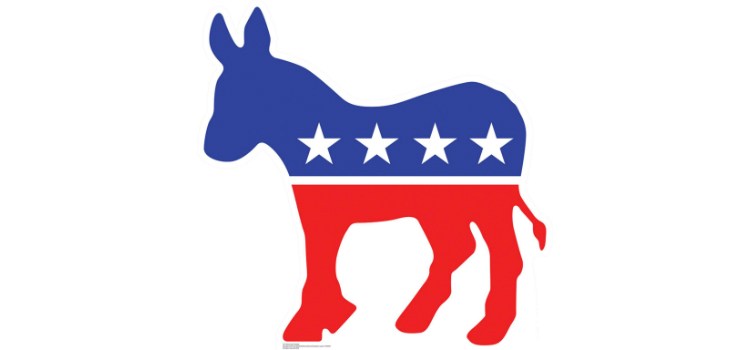
By Tory Gavito & Sean Mcelwee
At a critical juncture before the 2020 elections, the leadership of the Democratic Party is, perplexingly, abandoning key constituencies of its base, including young people, women, and people of color, as well as the policies that fire them up. In chasing a narrow swath of white swing voters, the leadership has ignored a broader coalition of voters who have delivered blue victories time and time again. Not only that—at times, it’s actively antagonizing them.
Even though the multiracial coalition that re-elected Obama in 2012 and stayed home in 2016 was large enough to change the outcome of the election, the Democratic leadership has focused on voters who swung from Barack Obama to Donald Trump. Party leaders have also taken to kneecapping up-and-coming progressives. Earlier this year, the DCCC—the party’s House campaigns arm—announced that it will blacklist firms that work with primary challengers, despite their delivering exciting new talent, reflective of its base, like congresswomen Alexandria Ocasio-Cortez of New York and Ayanna Pressley of Massachusetts.

Biden’s campaign is based around the thesis that good old boys can sit down over beers and pass comprehensive climate legislation. It’s more absurd than anything the left has proposed.
This has led them to positions at odds with the values of the Democratic electorate. In the very same week that Alabama passed a full-fledged abortion ban, in what appears to be a coordinated, Republican-led attack on women’s reproductive rightsin several states, DCCC chairwoman Cheri Bustos planned a fundraiser for Illinois congressman Dan Lipinski, an anti-choice, anti-LGBT Democrat who opposed the Affordable Care Act and refused to endorse President Barack Obama in 2012. In his safe blue district, he faces a primary challenge from mainstream, pro-choice progressive Marie Newman, who lost many of her consultants after the DCCC announced its blacklist.
Protecting incumbents, not rights
The backlash against the fundraiser for Lipinski—who supports abortion bans—was, predictably, swift and furious. Facing pressure, Bustos dropped out of it, but she had already signaled to the base that she valued incumbency over protecting a woman’s right to choose from the onslaught of right-wing attacks.
Bustos also made it clear that she sees the path to victory for Democrats in white swing voters, rather than in mobilizing the base of young voters and voters of color. She, along with other members in leadership like House Speaker Nancy Pelosi and House Majority Leader Steny Hoyer routinely undermine their colleagues’ bold initiatives, such as Medicare for All and the Green New Deal …
(Commoner Call cartoon by Mark L. Taylor, 2019. Open source and free for non-derivative use with link to www.thecommonercall.org )
*****
‘Gatekeeper Mentality’ Of DCCC Blacklist Aggravating Divisions Within Democratic Party
By Common Dreams (6/2/19)
Progressive Democrats are going on record with their displeasure over the establishment higher-up’s decision to protect incumbents, a reflection of the party’s division over a vendor blacklist.
On Sunday, The New York Times published an article from reporter Jennifer Steinhauer in which a number of the party’s rising stars took public positions against a March decision by the Democratic Congressional Campaign Committee (DCCC) to blacklist vendors who work with anyone—including primary challengers—who run against an incumbent Democrat.
As Common Dreams reported at the time, the policy says the DCCC “will not conduct business with, nor recommend to any of its targeted campaigns, any consultant that works with an opponent of a sitting member of the House Democratic Caucus.”
Rep. Jahana Hayes (D-Conn.), who won her seat by beating fellow political newcomer Mary Glassman in a primary contest for retiring Rep. Elizabeth Esty in 2018 before winning the general election, said that the policy is choking off the possibility of fresh ideas and and a new generation of leaders.
Gatekeeper mentality
“If I waited my turn, I wouldn’t be here,” Hayes told the Times. “There is a gatekeeper mentality that sometimes can diminish new ideas.”
That point was echoed by Steve Welchert, a spokesperson for Crisanta Duran, who is challenging Rep. Diana DeGette (D-Colo.) in next year’s primary.
“It is having a chilling effect on everyone’s capacity to move forward,” said Welchert, who also called the DCCC policy “bullying.”
Other Democrats Steinhauer spoke to were more specific in their criticism, citing the party’s incumbent bench of white men as the main thing that will be protected by the new rules. Two-thirds of the caucus’s longest-serving members are white, and two-thirds are men.
“It is hard enough for challengers, for a lot of reasons,” said the consultant, Amy Pritchard, who worked last year for Representative Ayanna Pressley, Democrat of Massachusetts, in her successful campaign to defeat a 10-term Democratic incumbent. “And this policy is a bridge too far. I’d like to see a majority of women in Congress, and it’s not going to happen with this policy.”
….
The new policy will most likely block candidates seeking to follow in the footsteps of Ms. Pressley, who is black, and Representative Alexandria Ocasio-Cortez of New York, who is of Puerto Rican descent, both of whom defeated veteran white male Democrats last year, Michael Capuano and Joseph Crowley.
Daily Show co-creator Lizz Winstead, in an angry tweet, sounded off on the policy.
“The only time they support getting more women is when male incumbents leave or die,” said Winstead.
“It makes sense that the incumbent faction would try to block the challengers,” writer David Menefee-Libey said on Twitter, adding that he was referring both to candidates and the entrenched consultant class that runs Democratic campaigns.
Incumbent-protection
Menefee-Libey’s read was similar to that of NBC News reporter Jonathan Allen, who put the DCCC action in the context of where the organization gets its money—and who it protects. They’re not necessarily the same people, said Allen.
“The DCCC is an incumbent-protection organization funded in part by member dues,” Allen said. “But, over time, its budget has grown as a result of fundraising outside of members and their big-dollar supporters. So, they’re now asking grassroots to fund incumbent-protection services.”
Thus far the policy has only been softly enforced, but it’s had an effect.
In April, Common Dreams reported that Marie Newman, an Illinois Democrat challenging anti-choice incumbent Rep. Dan Lipinski (D-Ill.), was having trouble finding people to work on her campaign due to the blacklist. Earlier that month, a story at The Intercept showed the same issue was being navigated by McKayla Wilkes, who is running to replace longtime Democrat Rep. Steny Hoyer (D-Md.).
“Progressive challengers like Marie Newman will see more of this cronyism,” said Progressive Change Committee’s Marissa Barrow.
“But,” Barrow said, “the progressive grassroots will have their backs.”
(Our work is licensed under a Creative Commons Attribution-Share Alike 3.0 License. Feel free to republish and share widely.)

